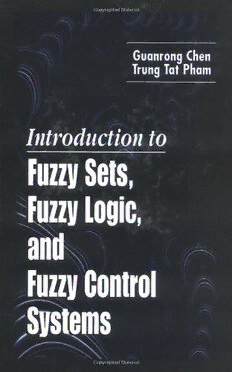Download Introduction to Fuzzy Sets, Fuzzy Logic, and Fuzzy Control Systems PDF Free - Full Version
Download Introduction to Fuzzy Sets, Fuzzy Logic, and Fuzzy Control Systems by Chen G, Pham T in PDF format completely FREE. No registration required, no payment needed. Get instant access to this valuable resource on PDFdrive.to!
About Introduction to Fuzzy Sets, Fuzzy Logic, and Fuzzy Control Systems
In the early 1970s, fuzzy systems and fuzzy control theories added a new dimension to control systems engineering. From its beginnings as mostly heuristic and somewhat ad hoc, more recent and rigorous approaches to fuzzy control theory have helped make it an integral part of modern control theory and produced many exciting results. Yesterday's "art" of building a working fuzzy controller has turned into today's "science" of systematic design.To keep pace with and further advance the rapidly developing field of applied control technologies, engineers, both present and future, need some systematic training in the analytic theory and rigorous design of fuzzy control systems. Introduction to Fuzzy Sets, Fuzzy Logic, and Fuzzy Control Systems provides that training by introducing a rigorous and complete fundamental theory of fuzzy sets and fuzzy logic, and then building a practical theory for automatic control of uncertain and ill-modeled systems encountered in many engineering applications. The authors proceed through basic fuzzy mathematics and fuzzy systems theory and conclude with an exploration of some industrial application examples.Almost entirely self-contained, Introduction to Fuzzy Sets, Fuzzy Logic, and Fuzzy Control Systems establishes a strong foundation for designing and analyzing fuzzy control systems under uncertain and irregular conditions. Mastering its contents gives students a clear understanding of fuzzy control systems theory that prepares them for deeper and broader studies and for many practical challenges faced in modern industry.
Detailed Information
| Author: | Chen G, Pham T |
|---|---|
| Publication Year: | 2000 |
| ISBN: | 9780849316586 |
| Pages: | 329 |
| Language: | English |
| File Size: | 2.92 |
| Format: | |
| Price: | FREE |
Safe & Secure Download - No registration required
Why Choose PDFdrive for Your Free Introduction to Fuzzy Sets, Fuzzy Logic, and Fuzzy Control Systems Download?
- 100% Free: No hidden fees or subscriptions required for one book every day.
- No Registration: Immediate access is available without creating accounts for one book every day.
- Safe and Secure: Clean downloads without malware or viruses
- Multiple Formats: PDF, MOBI, Mpub,... optimized for all devices
- Educational Resource: Supporting knowledge sharing and learning
Frequently Asked Questions
Is it really free to download Introduction to Fuzzy Sets, Fuzzy Logic, and Fuzzy Control Systems PDF?
Yes, on https://PDFdrive.to you can download Introduction to Fuzzy Sets, Fuzzy Logic, and Fuzzy Control Systems by Chen G, Pham T completely free. We don't require any payment, subscription, or registration to access this PDF file. For 3 books every day.
How can I read Introduction to Fuzzy Sets, Fuzzy Logic, and Fuzzy Control Systems on my mobile device?
After downloading Introduction to Fuzzy Sets, Fuzzy Logic, and Fuzzy Control Systems PDF, you can open it with any PDF reader app on your phone or tablet. We recommend using Adobe Acrobat Reader, Apple Books, or Google Play Books for the best reading experience.
Is this the full version of Introduction to Fuzzy Sets, Fuzzy Logic, and Fuzzy Control Systems?
Yes, this is the complete PDF version of Introduction to Fuzzy Sets, Fuzzy Logic, and Fuzzy Control Systems by Chen G, Pham T. You will be able to read the entire content as in the printed version without missing any pages.
Is it legal to download Introduction to Fuzzy Sets, Fuzzy Logic, and Fuzzy Control Systems PDF for free?
https://PDFdrive.to provides links to free educational resources available online. We do not store any files on our servers. Please be aware of copyright laws in your country before downloading.
The materials shared are intended for research, educational, and personal use in accordance with fair use principles.

